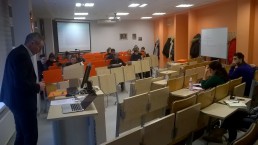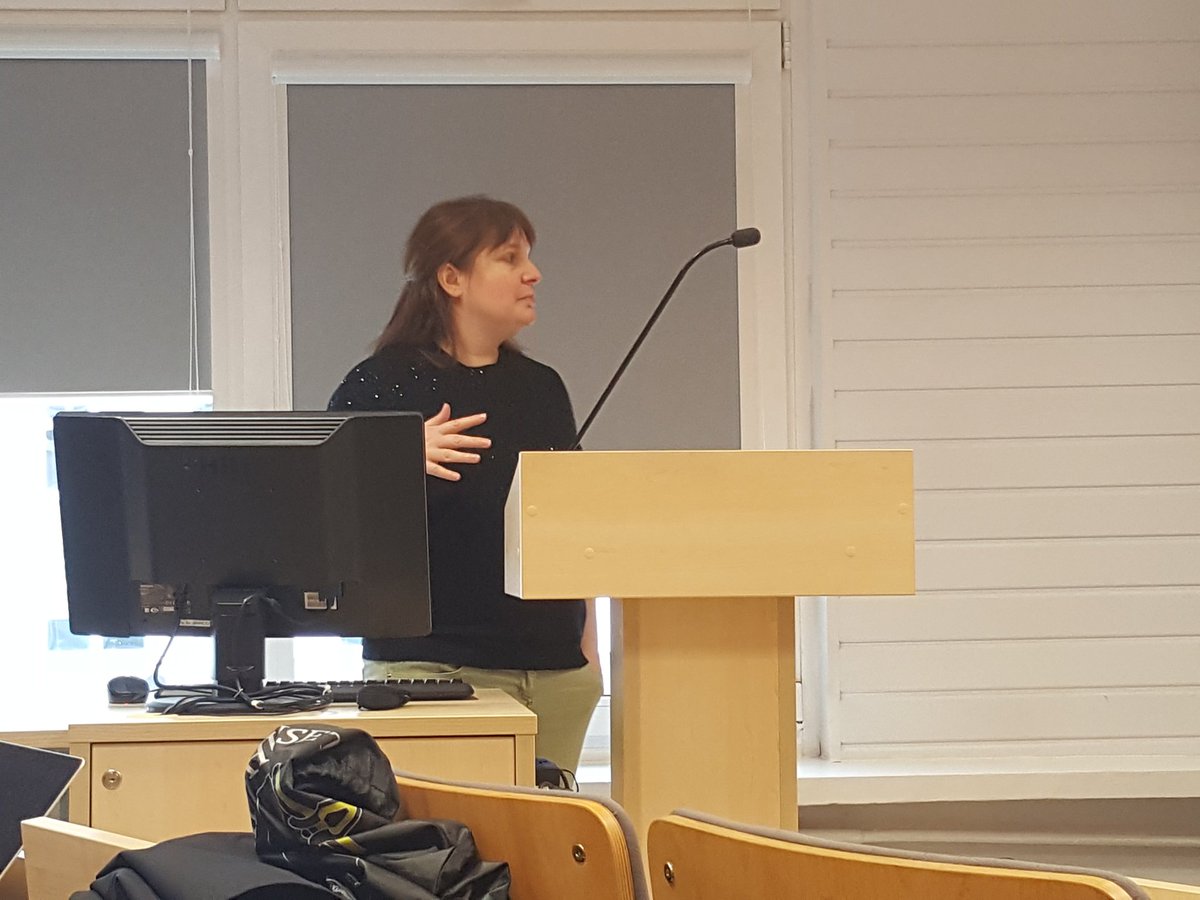Core Group Meeting in Turku in Finland
 COST-ARKWORK Core Group held a two-day meeting in Turku (Åbo), Finland on Oct 4-5, 2018 with a focus on a status and progress report after two years of activities and planning of future activities within the Action. The Core Group was glad to see that the Action is running well and a lot of progress has been made to reach the objectives of the action even if there is a lot of work left for the next two years and beyond. During the next two years, ARKWORK will be organising a series of industry forums, the first one focusing on contract archaeology being scheduled to January 2019, conferences and workshops, and two more training schools. There are also plenty of opportunities for research exchange within the ARKWORK STSM mechanism for the current and future members of the Action.
COST-ARKWORK Core Group held a two-day meeting in Turku (Åbo), Finland on Oct 4-5, 2018 with a focus on a status and progress report after two years of activities and planning of future activities within the Action. The Core Group was glad to see that the Action is running well and a lot of progress has been made to reach the objectives of the action even if there is a lot of work left for the next two years and beyond. During the next two years, ARKWORK will be organising a series of industry forums, the first one focusing on contract archaeology being scheduled to January 2019, conferences and workshops, and two more training schools. There are also plenty of opportunities for research exchange within the ARKWORK STSM mechanism for the current and future members of the Action.
WG2 Workshop on Managing Small Archaeological collections
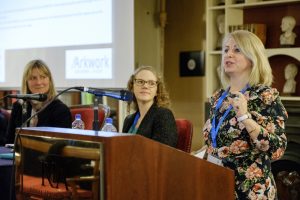
The workshop organised in Dublin gathered experts interested best practices for managing small collections of artefacts. Such artefacts may be part of a larger collection or may be too small to warrant professional tools and policies designed for larger collections, but still need care. This workshop provided attendees with information about how to gain intellectual control and provide access to these smaller collections of items, using best practices from archaeology.
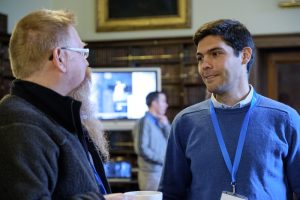
Experts from across the EU presented case studies to introduce topics related to physical and intellectual access, adopting good practices, and using digitsation wisely. Participants worked on exercises, drawing on the case studies to develop best practices for their own situation as well as contribute to a website listing best practices for small artifact collections, all with the assistance of EU experts.
Invited talk
Ms. Sarah Castigan, the Deputy Director of the Little Museum of Dublin, provided the keynote at the WG2 workshop on Managing Small Collections, held in Dublin in April, 2018. She spoke of working with different community groups in developing collections.
Workshop Programme
9am-9:30am registration/coffee
9:30-10:30am Introduction
10:30-11:30 Case study 1: Physical and intellectual access of archaeological objects
Marina Toumpouri (Aristotle Univ., Cyprus) will present a case study about Ecclesiastical objects.
11:30-12:00 Coffee break
For special dietary considerations, please contact Dr. Cushing at [email protected] once registered.
12:00-1:00 Case study 2: Good practices for small archaeological collections
Eszter Istvanov and (Lorand Univ, Hungary) Valeria Kulcsar (Univ. of Pecs, Hungary) will present a case study about school collections.
1:00-2:00 Lunch
Lunch will include a selection of sandwiches, salads and sides. For special dietary considerations, please contact Dr. Cushing at [email protected] once registered.
2:00-3:00 Case study 3: Digitisation of small archaeological collections
Meliha Handzic (Burch Univ, Bosnia and Herzegovina) will present a case about using digitisation to provide access to a municipal collection of Bosnian medieval tombstones.
3:00-3:45 Coffee break
For special dietary considerations, please contact Dr. Cushing at [email protected] once registered.
3:45-5pm Development of guidelines
Gisli Palsson (The Institute of Archaeology, Iceland) and Amber Cushing (Schol of Information & Communication Studies, UCD) will act as moderators and lead a session to help participants extract useful information from the case studies for their own situation, as well as some general guidelines/take aways for managing small collections of artefacts. Additional COST members from across Europe will be available to share their expertise and assist attendees.
About the speakers
Marina Toumpouri completed her undergraduate studies in Musicology and Art History at the Universities of Lorraine and Strasbourg. She received her Ph.D. in Art history in 2010 from the University of Lille 3-Charles de Gaulle. Her research and publications deal with hagiographic iconography, the production of Western and Greek illuminated manuscripts in the Eastern Mediterranean (12th-15th century), the materiality of manuscripts and the use of new tools and methodologies for identifying the methods of work of medieval artists and craftsmen. She is currently member of the Mount Athos manuscripts’ digitization project team (Athoniki Psifiaki Kivotos) and prior she was involved in the digitization project of the Greek papyri of the National University Library of Strasbourg. She was involved in different research projects in France, Cyprus, Greece and the U.K. and previously she held a curatorial position at the department of monuments and relics of the Church of Cyprus (The Holy Bishopric of Limassol). She was the recipient of a number of research grants.
Valéria Kulcsár holds an MA in archaeology and history and a PhD in the science of history from the Hungarian Academy of Sciences. She has worked as an archaeologist at the Petőfi Museum, Aszód (Directory of Pest County Museums), and Katona József Museum, Kecskemét (Directory of Bács-Kiskun County Museums). She is currently academic staff at University of Pécs (Pécs, Hungary). Her research interests include Roman Age Barbarians and the Early Migration Period.
Eszter Istvánovits holds a PhD in archaeology from the Hungarian Academy of Sciences. She has worked as the archaeological coordinator of excavations and other capital construction works in Hungary as well as a archaeologist-museologist at the Jósa András Museum, Nyíregyháza (Directory of Szabolcs-Szatmár-Bereg County Museums). Her area of interest is Barbarians of Roman Age (Sarmatians, Germans, Dacians), Hun Age, Early Migration Period.
Meliha Handzic is Professor of Management and Information Systems at the International Burch University, Sarajevo. Her PhD is from the University of New South Wales, Sydney. Meliha’s main research interest lies in the area of knowledge management (KM), with a particular focus on the processes and socio-technological enablers of knowledge creation, sharing, retention and discovery. She has published extensively on these topics in leading journals, international conference proceedings and books. Presently, Meliha is an active member of several professional societies and groups and serves on editorial boards, executive and program committees for numerous international journals and conferences. She is also a recipient of the KM Leadership Award in 2014.
Gísli Pálsson is a landscape archaeologist who primarily works in Iceland and Sweden, affiliated with The Institute of Archaeology, Iceland and Umea University. Gisli’s main concerns in archaeology are landscape survey, archaeoinformatics, network analysis and the role of creativity in archaeological practice. His fieldwork in recent years has concentrated on Viking Age ceremonial landscapes and movement systems, both in Iceland. Gísli is currently conducting research into the role of resource claims and property ownership on agricultural land use through the project Storied lines: tracing the tendrils of agency across the Icelandic landscape (http://jardabok.com).
Amber L. Cushing is a Lecturer/Assistant Professor at the School of Information and Communication Studies, University College Dublin in Ireland where she also serves as Director of the Msc in Digital Curaiton Programme and Director of the PhD in Information and Communication Studies Programme. She previously served as Director of the Allenstown, NH Public Library while managing her consulting business, Cushing Information Consulting. She has taught graduate courses in Digital Curation, Research Methods, Information Resources and Services, Archival Access and Technology Issues and Archival Outreach. Cushing holds a PhD in Information and Library Science from the University of North Carolina at Chapel Hill, an MLIS with a concentration in Archives Management from Simmons Graduate School of Library and Information Science, and a BA in History from Mount Holyoke College. Her main area of study concerns how individual perceptions of value in digital collections can influence institutional practices in LAMs.
Materials
- http://www.vhnireland.org/past-conferences/conference-2018-2/pre-conference-workshop-2018//
- Highlights from the workshop on video (until 0:24) at https://www.youtube.com/watch?v=hIT3ANiHPQ8
STSM opportunities in ARKWORK
As a researcher or professional, you are encouraged to propose your own short-term scientific mission to get training at an institution in a COST-ARKWORK participating country, which is not your current country of residence. On this page you will find selected opportunities for STSMs but in addition to those listed, you are encouraged to approach any relevant institutions and apply for funding to complete your own STSM that advances the aims of ARKWORK. This list will be updated when new opportunities are proposed.
Opportunities at institutions in ARKWORK network
Department of ALM, Uppsala University
Field of expertise: Empirical methods of studying archaeological information work, knowledge production, information management and knowledge organisation including action research, interviewing, participatory observation and document studies.
Description: The research conducted at the Department of ALM of Uppsala University brings together perspectives from archival studies, information studies and museum and cultural heritage studies. The unique aspect of research in Uppsala is that it nurtures an interdisciplinary interest in information and knowledge infrastructures, collections and societal memory from the vantage point of the changing premises, patterns and practices of their making, organisation, management and use from historical and contemporary perspectives. The contexts and topics of research range from institutions to individuals, from historical to contemporary, analogue to digital, professional to participatory, work to play, making to mediating and from competences to the policies of regulating them in the society. Uppsala University Museum Gustavianum does also host considerable archaeological collections and there are regional and national collections and institutions both in Uppsala and close to us in Stockholm.
Location: Uppsala, Sweden
Website: www.abm.uu.se
Contact: Prof. Isto Huvila, Uppsala University
Multi-site projects
Finds databases
Study on finds databases for non-professional archaeological discoveries (including but not exclusively metal detectorists), including commonalities, making recommendations for better coordination of efforts, weaknesses, etc.
If interest to take this forward, ST will discuss with finds database coordinators to see if hosting possible. Perhaps coordinated number of STSM researchers at different locations but working together.
Possible locations: Possible several corresponding researchers going to different sites where databases existing or in development: Århus, Vrije Universiteit Brussel, Vrije Universiteit Amsterdam, British Museum.
Contact: Dr. Suzie Thomas, University of Helsinki
COST-ARKWORK meeting in Vilnius
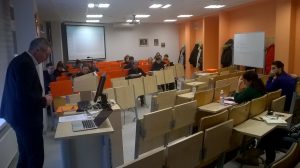 COST-ARKWORK is organising a joint meeting of all working groups, exploratory workshops for WG3 and WG4 for mapping the issues pertaining to the topics of these two groups, and a management committee meeting for the action in Vilnius, Lithuania. The event is hosted by the Faculty of Communication, Vilnius University.
COST-ARKWORK is organising a joint meeting of all working groups, exploratory workshops for WG3 and WG4 for mapping the issues pertaining to the topics of these two groups, and a management committee meeting for the action in Vilnius, Lithuania. The event is hosted by the Faculty of Communication, Vilnius University.
Meeting in social media
- Storify of COST-ARKWORK Vilnius meeting available.
Keynote presentations at the WG3 and WG4 Exploratory Workshops
- Dr. Suzie Thomas, University of Helsinki, FI : Non-professional engagements with archaeology: Problems, Prospects and Possibilities (PDF)
- Dr. Henriette Roued-Cunliffe, University of Copenhagen, DK : Participatory Heritage and amateurs (PDF)


